De Roemeens-Franse dichter, toneelschrijver, literair criticus, regisseur en vertaler Fondane Benjamin (eig. Benjamin Wechsler) werd geboren op 14 november 1898 in Iaşi. Zie ook mijn blog van 14 november 2010.
Préface en prose (Fragment)
C’est à vous que je parle, homme des antipodes,
Je parle d’homme à homme,
avec le peu en moi qui demeure de l’homme
avec le peu de voix qui me reste au gosier,
mon sang est sur les routes, puisse-t-il, puisse-t-il
ne pas crier vengeance !
L’hallali est donné, les bêtes sont traquées,
laissez-moi vous parler avec ces mêmes mots
que nous eûmes en partage –
il reste peu d’intelligibles !
Un jour viendra, c’est sûr, de la soif apaisée,
nous serons au-delà du souvenir, la mort
aura parachevé les travaux de la haine,
je serai un bouquet d’orties sous vos pieds,
– alors eh bien sachez que j’avais un visage
comme vous. Une bouche qui priait, comme vous.
Quand une poussière entrait, ou bien un songe,
dans l’oeil, cet oeil pleurait un peu de sel. Et quand
une épine mauvaise égratignait ma peau,
il y coulait un sang aussi rouge que le vôtre !
Certes, tout comme vous j’étais cruel, j’avais
soif de tendresse, de puissance, d’or, de plaisir, de
douleur.
Tout comme vous j’étais méchant et angoissé
solide dans la paix, ivre dans la victoire,
et titubant, hagard, à l’heure de l’échec !
Oui, j’ai été un homme comme les autres hommes,
nourri de pain, de rêve, de désespoir. Eh oui, j’ai
aimé, j’ai pleuré, j’ai haï, j’ai souffert,
j’ai acheté des fleurs et je n’ai pas toujours
payé mon terme. Le dimanche j’allais à la
campagne pêcher, sous l’oeil de Dieu, des poissons
irréels,
je me baignais dans la rivière
qui chantait dans les joncs et je mangeais des frites
le soir. Après, après, je rentrais me coucher
fatigué, le coeur las et plein de solitude,
le coeur plein de pitié pour moi,
plein de pitié pour l’homme,
cherchant, cherchant en vain sur un ventre de
femme cette paix impossible que nous avions
perdue naguère, dans un grand verger où fleurissait
au centre, l’arbre de la vie …
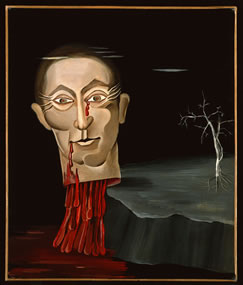
Fondane Benjamin (14 november 1898 – 2e of 03 oktober 1944)
Portret door Victor Brauner
De Engelse schrijver Eric Lawson Malpass werd geboren op 14 november 1910 in Derby. Zie ook mijn blog van 14 november 2010.
Uit: Morgens um sieben ist die Welt noch in Ordnung (Vertaald door Brigitte Roeseler)
„Morgendämmerung und ein Himmel wie kalter Haferbrei. In den Winkeln des Daches noch
ein paar Flecken nassen Schnees.
In dem großen, weitläufigen Haus lag die Familie im sonntagmorgendlichen Winterschlaf,
eingekuschelt gegen die Kälte und den kommenden Tag.
Aber Gaylord war gegen Kälte unempfindlich. Der junge Gaylord Pentecost war gegen die
meisten Dinge unempfindlich. Gleich nach dem Aufwachen hopste er erst mal ein bisschen auf
dem Bett herum. Als ihm das langweilig wurde, zog er die Schlafanzughose auf seine nicht vorhandene Taille herauf und machte sich auf eine Besuchstour durch das Haus.
Zuerst war Opa an der Reihe. In seinem Zimmer war es noch dunkel. Gaylord zog die Vorhänge
auf. Die Vorhänge hingen an Messingringen. Wenn andere sie zurückzogen, klapperten
sie wie Kastagnetten. Wenn Gaylord sie zurückzog, klang es wie eine Maschinengewehrsalve.
Opa öffnete nicht einmal die Augen. «Verschwinde, zum Teufel noch einmal», sagte er.
Opa wirkte unter der Bettdecke wie ein massiver, kleiner runder Berg. Gaylord nahm einen
Anlauf und landete mitten auf dem Berg. «Ich bin ein Ritter», schrie er. «Und du bist mein
Schlachtross.»
«Ich bin kein Schlachtross», sagte Opa. «Ich bin ein alter Mann, der seine Ruhe haben will.
Herrgott nochmal.»
Neugierig berührte Gaylord mit dem Finger eins der faltigen Augenlider. Er schob das Lid
nach oben und betrachtete nachdenklich das gelbe, Unheil verkündende Auge. Er ließ das
Lid wieder herunterklappen. «Soll ich dir eine Tasse Tee machen?»
«Wenn du recht lange dazu brauchst, ja»,
sagte Opa. Gaylord kletterte von ihm herunter.
«Geht wie der Blitz», antwortete er vergnügt.
«Bitte, lass dir Zeit», sagte Opa.
Gaylord spazierte weiter zu Großtante Marigold.
«Willst du eine Tasse Tee haben?», schrie er von der Tür her.“
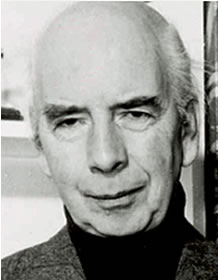
Eric Malpass (14 november 1910 – 16 oktober 1996)
De Egyptische schrijver Taha Hussein werd geboren in Al Minya in Egypte op 14 november 1889. Zie ook alle tags voor Taha Hussein op dit blog.
Uit: The Days
“From that day our lad’s outlook on life was completely changed. He really knew God and was at great pains to draw near to Him by every possible means, from alms-giving to earnest prayer and the recitation of the Qur’an… From that day the lad knew what night vigils were, for many a time he would spend the dark hours of a whole night, either thinking about his brother or reciting Surat al-Ikhlas [chapter of Qur’an] thousands of times.
(…)
They start the Zikr sitting in silence. Then they begin to move their heads and raise their voices a little. Then a shudder runs through their bodies and lo! they are all standing, having leapt into the air like jacks-in-the-boxes. . The sheikhs move about the circle, reciting the poetry of Ibn Farid and similar poems.”
(…)
Now the connection of the family with one of the Sufi sects was strong and lasting. It left among them many lasting traces in the way of information, stories and talk about miracles and supernatural events.”
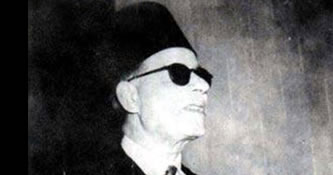
Taha Hussein (14 november 1889 – 28 oktober 1973)
De Italiaanse dichter Aleardo Aleardi werd geboren op 14 november 1812 in Verona. Zie ook alle tags voor Aleardo Aleardi op dit blog.
Cowards
In the deep circle of Siddim hast thou seen,
Under the shining skies of Palestine,
The sinister glitter of the Lake of Asphalt?
Those coasts, strewn thick with ashes of damnation,
Forever foe to every living thing,
Where rings the cry of the lost wandering bird
That on the shore of the perfidious sea
Athirsting dies,–that watery sepulchre
Of the five cities of iniquity,
Where even the tempest, when its clouds hang low,
Passes in silence, and the lightning dies,–
If thou hast seen them, bitterly hath been
Thy heart wrung with the misery and despair
Of that dread vision!
Yet there is on earth
A woe more desperate and miserable,–
A spectacle wherein the wrath of God
Avenges Him more terribly. It is
A vain, weak people of faint-heart old men,
That, for three hundred years of dull repose,
Has lain perpetual dreamer, folded in
The ragged purple of its ancestors,
Stretching its limbs wide in its country’s sun,
To warm them; drinking the soft airs of autumn
Forgetful, on the fields where its forefathers
Like lions fought! From overflowing hands,
Strew we with hellebore and poppies thick
The way.
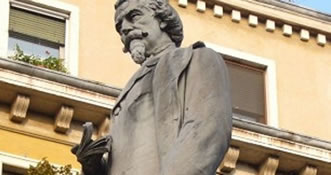
Aleardo Aleardi (14 november 1812 – 17 juli 1878)
Standbeeld in Verona
De Deense dichter en schrijver Adam Gottlob Oehlenschläger werd geboren op 14 november 1779 in Vesterbro, Kopenhagen. Zie ook alle tags voor Adam Oehlenschläger op dit blog.
Christ’s Birth
Each year when vapours melt and wane,
Child Jesus Christ is born again;
The Angel in air, in grove, in sea.
It is the Saviour, it is He.
Wherefore all Nature, with serene
Rejoicing, buds in hopeful green.
Now the young stainless shepherd lads.
Watching the stars’ high myriads,
See God’s angels in fields of night
Assemble, trembling in cool moonlight.
“To-day a Saviour is born,” they sing,
“From gentle Mary’s womb, from spring.
“His only drink is the earliest dew.
His eyes gaze heavenward into the blue,
His hands reach heavenward; they are bound
With garlands of roses to the ground.
His cry is the breeze, in the straw he lies,
Blue heaven mirrored in his eyes.
“Ah shepherds, go to Bethlehem;
Seek the cold-hearted, counsel them
To go into the fields, and find
The laughing Child, green grass-entwined,
And hear his voice, and see his smile.
That heaven may lift the earth awhile.”
The hovering angels reascend.
To Bethlehem the shepherds wend.
And tell their happy news, but they
Are scorned, and mocked, and turned away
Back to the meadows, where the sod
Blooms with the new-born Child of God.
The stars stretch forth their silver hands
And beckon the kings of the eastern lands ;
The rays come singing with holy sound
And humbly sink to the living ground.
Praising the Lord made manifest.
Who smiles from the Mother’s lovely breast.
They rise again from the darkened mould
In petals of purple, crimson, and gold,
Innocent children, devout and fair.
Half-lifted, half-bent to the earth in prayer,
Holding their yellow urns astir
With the sweetness of frankincense and myrrh.
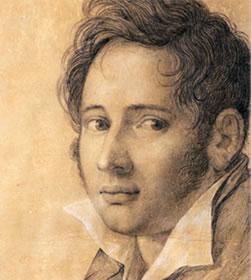
Adam Oehlenschläger (14 november 1779 – 20 januari 1850)
Zie voor onderstaande schrijvers ook mijn blog van 14 november 2010.
De Oostenrijkse dichter, schrijver, essayist en vertaler Herbert Zand werd geboren op 14 november 1923 in Knoppen.
De Zwitserse schrijver Jakob Schaffner werd geboren op 14 november 1875 in Basel. Zie ook mijn blog van 14 november 2008.
